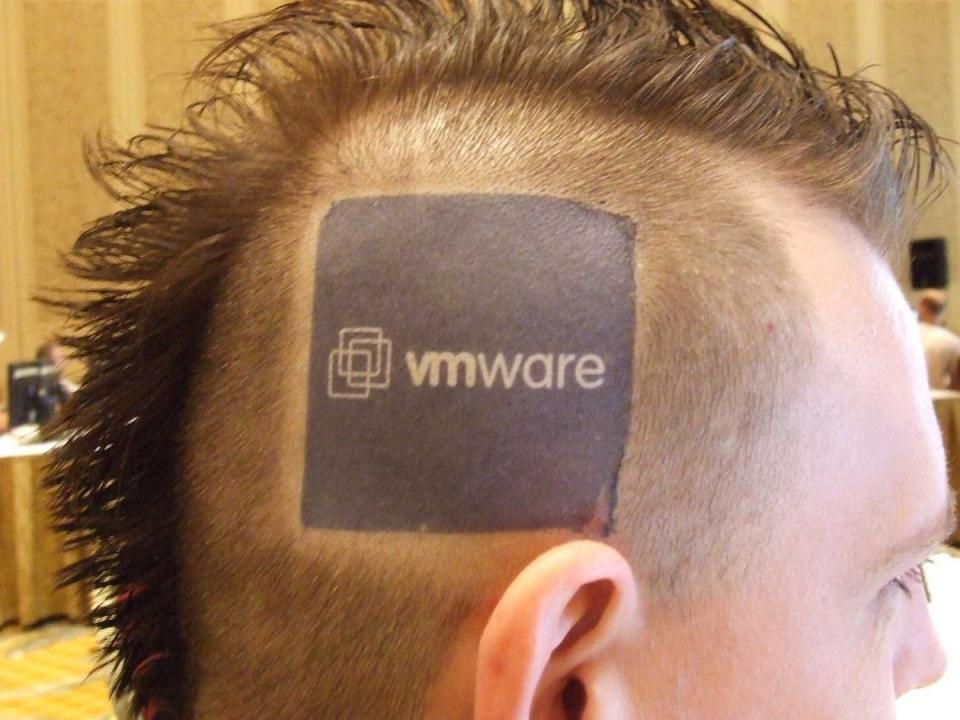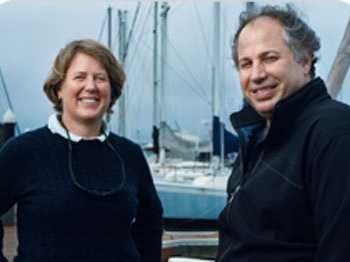Meet VMware, The Scrappy Company That Everyone Wants To Buy … Or Crush

VMware
Senior Systems Engineering Manager at VMware Andre Andriolli shows off his tattoo.
In the multibillion-dollar world of enterprise computing, all eyes these days are on a company you may only be vaguely familiar with: VMware.
VMware is both a publicly traded company and a subsidiary of computer storage giant EMC, which owns 90% of VMware’s shares.
It is the crown jewel of EMC’s famous “federated strategy,” in which EMC owns controlling interests in a wide variety of tech companies.
Jump straight to the pictures of VMware’s campus>>
And it’s at the center of a big fight.
Activist investor Elliott Management is pressuring EMC to break itself up and spin VMware out, which the investor says is worth a lot more money on its own. (VMware’s stock trades for about $89, with a $38.5 billion market cap. EMC trades for about $27 with a market cap of $55.3 billion.)
Hewlett-Packard was contemplating buying EMC in a mega merger, in part to get its hands on the undervalued VMware. Meanwhile, Cisco wants to crush VMware before VMware pulls the rug out from Cisco. And Microsoft has been trying to crush VMware for years, with Red Hat competing, too.
All of this is because VMware is the leader in a bunch of enterprise technologies known as “virtualization.”
VMware’s flagship product is something called “server virtualization” which tricks a computer server into being able to run multiple operating systems. It lets a single computer run different versions of Windows (and many Windows apps), different versions of Linux (and many Linux apps), Unix (and Unix apps), and so on.
This allows an enterprise to buy fewer servers and use each one its max.
Imagine it this way: What if you could buy one PC and use it to run Windows XP, Windows 8, Mac, iOS, and Android apps all at the same time?
VMware’s tech caught on like wildfire in its early days, catching the wrath of Microsoft. Microsoft didn’t want people keeping their old Windows operating systems and apps. Its business model relies on people upgrading every few years.

Diane Greene and Mendel Rosenblum.
VMware’s board got so worried about Microsoft, it ousted the company’s brilliant cofounder Diane Greene, married to famous Stanford professor and cofounder Mendel Rosenblum. Rosenblum quit the company in a gesture of solidarity with his wife.
The board installed former Microsoft exec Paul Maritz as CEO. Maritz led VMware from 2008 to 2012 when he left to do another “federated” company; and EMC’s No. 2 exec, Pat Gelsinger, is now CEO. (Greene never lost her stature in the Valley. She is a behind-the-scenes powerhouse angel investor who sits on the boards of Google and Intuit.)
Under Greene and Maritz, VMware server software became wildly popular and is now used by most companies in the world. So VMware has turned its attention to other areas looking for growth. It created software that makes computer storage systems work more efficiently (called “storage virtualization”).
That’s what attracted EMC’s attention. EMC acquired VMware in 2004 for $625 million, and sold a 10% stake in an IPO three years later.
$625 million
$625 million
And now, VMware is going after Cisco’s market, with a tech called “software-defined networking” (SDN).
SDN makes it easier to build and run huge computer networks. Companies still need network equipment, but they need less of it, and less expensive versions, not good for the market leader, Cisco, which is firing back with its SDN products, and wants to crush VMware’s efforts.
VMware has over 16,000 employees worldwide. Its main campus is in the the famed Stanford Research Park in Palo Alto, California.

This campus is huge! 100 acres. 18 buildings.

The land is still owned by Stanford, where VMware got its start, and was leased by founding CEO Diane Greene.

Jeff Goodall, VMware’s facilities manager (and keeper of the turtles) is our tour guide.

The first thing you notice is the Zen-like quality of this campus. It’s part office space. Part garden.

Even the paths that connect buildings are pretty.

In the heart of campus is a concrete water feature …

But with the severe drought in California, the water is turned off so it looks like a Zen rock garden.

VMware aims for a “zero” carbon footprint. That building was made from recycled materials.

Naturally, the parking structure is filled with employees’ electric vehicles and charging stations. Where Google employees prefer Teslas, the Nissan Leaf rules here.

This is the turtle pond.

It is home to 13 turtles.

When VMware employees get engaged, coworkers ceremoniously throw them in the turtle pond.

The original turtle is Rosie. She’s hanging out with Zilla.

Where Facebook loves its foxes, this company is gaga for its turtles. This is a bus stop.

This is a turtle-crossing sign …

The campus is so big, it has its own outdoor amphitheater where they host parties and bands.

Here are VMware employees after running the J.P. Morgan Corporate Challenge race. Note the turtle mascot.

Although Diane Greene has long since left, her presence is felt in the understated architecture. This campus was her vision, employees told us.

VMware is the largest campus in the Stanford Research Park. This artwork is the hand prints of employees on the day this campus was opened.

Inside, employees enjoy their cafeterias, a theater and …

A full health club with weights, yoga, pilates, spinning …

… basketball, volleyball …

… and this torture device, which is for suspension fitness training.

VMware does NOT offer its employees free gourmet meals.

But it does have four cafeterias. Cook Alan Tan whips up some Chinese food.

The main cafeteria has breathtaking views of the foothills under the “heart lightening” sculpture.

Inside, art abounds, like these two Gibson prints.

VMware also has plenty of employee kitchens.

Stocked with free healthy snacks. Notice the bulk containers. The whole campus only has four waste bins.

Business Insider editor Julie Bort found GM Martin Casado near the kitchen. He sold his startup, Nicira, to VMware for $1.2 billion in 2012.

With this park-like setting and the California weather, employees have been known to hold meetings outside, Kumbaya-style.

Now visit the largest tech employer in the city of San Francisco …

Salesforce.com showers employees with breathtaking views, swag, and doggy daycare>>
Read more stories on Business Insider, Malaysian edition of the world’s fastest-growing business and technology news website.


